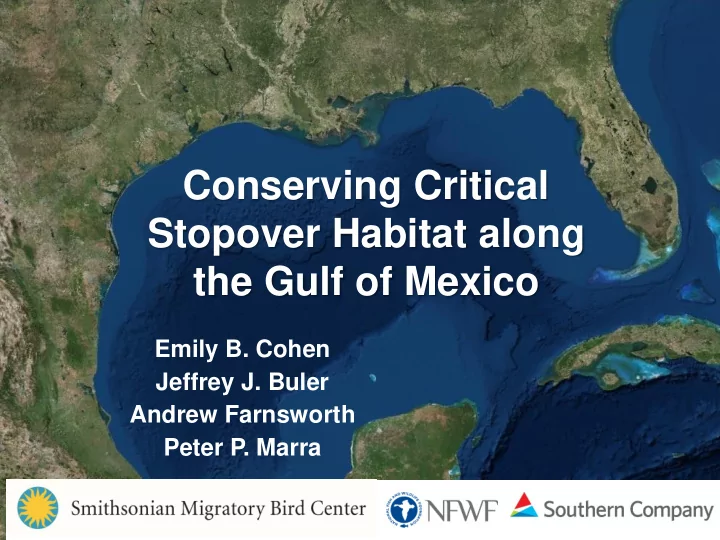

Conserving Critical Stopover Habitat along the Gulf of Mexico Emily B. Cohen Jeffrey J. Buler Andrew Farnsworth Peter P. Marra
Threats to Migrating Birds
Gulf Coast Habitats are Essential • North America’s breeding birds depend on the coast of the GOM for resting and refueling • Billions of birds congregate on beaches, marshes, and coastal forests during spring and fall • Many more pass through the airspace - also a critical habitat
Current Status • Poor understanding of migrant stopover distributions and use of airspace • We do not know if key habitats Wetland habitat at Powderhorn Ranch, TX and sites are protected • We now have the tools to measure the Gulf-wide distribution of migrants Scarlet tanager in coastal scrub habitat at Mad Island, TX
Objectives Comprehensive assessment of the distribution, abundance, timing and habitat affiliations of migratory birds in stopover and airspace habitat during spring and fall along the U.S. coast of the Gulf of Mexico
Methods Data source Measure Migrant density Low angle emerging from radar stopover habitat
Methods Data source Measure Migrant density, High angle direction & height in radar airspace
Methods Data source Measure Migrant focal species distributions & eBird richness
Methods Data source Measure Migrant density Low angle emerging from radar stopover habitat Migrant density, High angle direction & height in radar airspace Migrant focal species distributions & eBird richness
Methods: weather radar Brownsville, TX to Key West, FL • Spring and Fall • 2008- 2015
Preliminary results: Stopover Very recently finished processing all the spring data. Coming soon! Example map: Fall migration through the Northeast U.S Interpolate bird distributions across region outside of radar coverage using predictive model Buler and Dawson 2014 Condor
Preliminary results: Airspace Spring diurnal and nocturnal migration 34 ● 32 ● ● ● ● 30 ● ● Spatially Balanced 28 Test Set ● ● Density • AUC = 0.89 Direction 26 ● ● Variation in direction • Kappa = 0.57 ● 24 • Sensitivity(T+) = 0.67 −100 −95 −90 −85 −80 • Specificity(T-) = 0.89
Preliminary results: eBird BCR 37 Gulf Coastal Prairie Spring Yellow warbler April 26 Distribution Spatially Balanced Test Set • AUC = 0.89 • Kappa = 0.57 • Sensitivity(T+) = Blue = Detections 0.67 • Specificity(T-) = 0.89
Future Directions • Generate state-level maps of high priority land areas for spring and fall migrants in the air and on land • Classify the threats, vulnerability, and current conservation status of key habitats and sites • Measure the quality of habitats and the condition of migrants in areas where they occur
Critical Applications • Identify high priority areas for conservation of stopover habitat and passage corridors • Minimize the impacts of future developments • Identify where to target monitoring for at risk or declining species
Thank You
Recommend
More recommend